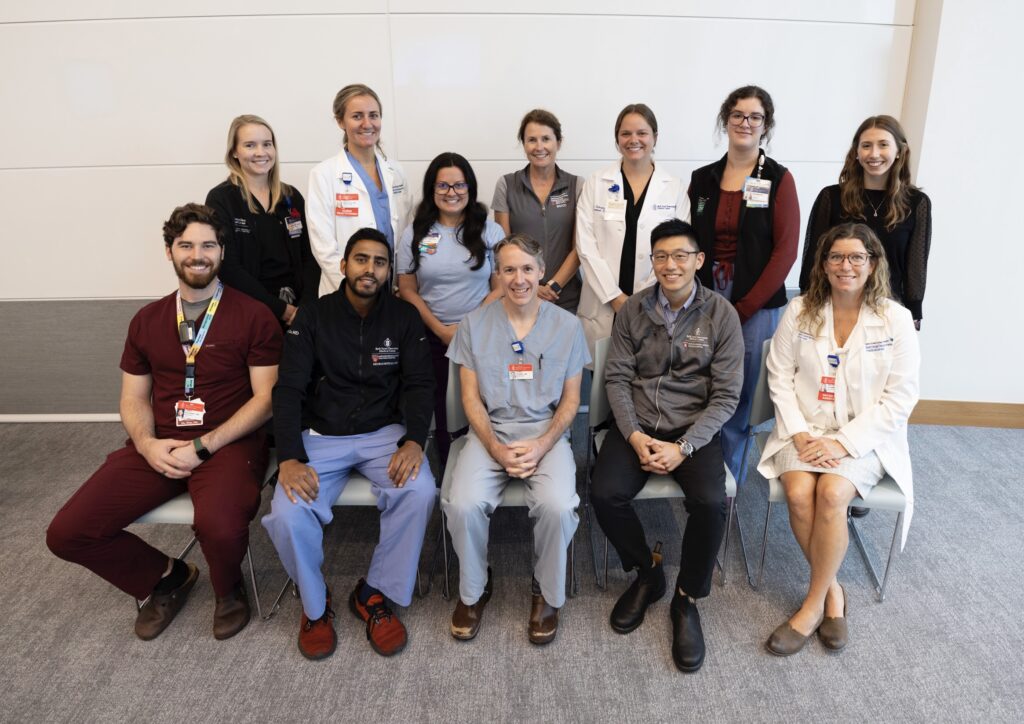The Neurocritical Care Fellowship is a two-year UCNS Accredited Fellowship Training Program available to graduates of ACGME accredited neurology residency programs. There is also a one-year Anesthesia Critical Care to Neurocritical Care Fellowship training program available. Neurocritical Care was recently added to the list of approved specialties by the ABMS.
We foster exceptional clinical training in neurocritical care with supported research opportunities in related clinical and basic neurosciences. What sets the Harvard/BIDMC program apart? Fully integrated critical care training due to our close relationship with the department of Anesthesia, Critical Care and Pain Medicine. Fellows in Neurocritical Care at BIDMC are key participants in the Anesthesia Critical Care Fellowship. This unique structure allows fellows to acquire advanced critical care expertise and procedural training in airway management, vascular access, bedside ultrasonography and echocardiography.
We provide our neurocritical care fellows with exposure to all aspects of the clinical practice and neurosciences with increasing autonomy and attainment of the positive characteristics of core competencies necessary to become outstanding independent practitioners and investigators necessary for future leadership in the field.
Fellowship Training Environment
Beth Israel Deaconess Medical Center (BIDMC) is a world-class teaching hospital of
Harvard Medical School located in the heart of Boston.
- 743 licensed beds, including 493 medical/surgical beds, 77 critical care beds
- A full range of emergency services, including a Level 1 Trauma Center and roof-top heliport
- The Neuroscience Intensive Care Unit is an 8-bed unit caring for the highest acuity patients, and an adjacent 16-bed neuro-intermediate care unit for patients requiring specialized monitoring and nursing care.
Biomedical Research
- Beth Israel Deaconess Medical Center consistently ranks as a national leader among independent hospitals in National Institutes of Health funding. Research funding totals over $229.8 million annually. BIDMC researchers run more than 850 active sponsored projects and 500 funded and non-funded clinical trials.
- The Harvard-Thorndike Laboratory, the nation’s oldest clinical research laboratory, has been located on this site since 1973.
- Beth Israel Deaconess Medical Center shares important clinical and research programs with institutions such as the Dana-Farber/Harvard Cancer Center, Joslin Diabetes Center and Children’s Hospital.
Teaching
- Beth Israel Deaconess Medical Center has 1,250 physicians on the active medical staff (including more than 800 full-time staff physicians). Most of these physicians hold faculty appointments at Harvard Medical School.
- In addition to its medical students, Beth Israel Deaconess Medical Center provides clinical education to students in nursing; social work; radiologic technology, ultrasound and nuclear medicine; and physical, occupational, speech and respiratory therapies.
The Carl J. Shapiro Institute for Education and Research provides medical students
and physicians in training with an on-site centralized educational facility, a state-of-the-art computer lab, and a variety of educational resources that let students diagnose, manage, and learn technical skills on simulated patients.
Fellowship Program Structure *
Throughout the 1-2 year program, fellows receive comprehensive training in all aspects of neurocritical care, and become experts in the diagnosis and management of neurologic emergencies resulting from a variety of conditions including brain and spinal trauma, stroke, status epilepticus, neuromuscular disorders, and autoimmune or infectious diseases involving the central nervous system. Our curriculum is based on guidelines set forth by the United Council for Neurologic Subspecialties as well as the American Board of Psychiatry and Neurology. While fellows spend the majority of their clinical time in the Neurosciences ICU, our seamless integration with other critical care training programs at BIDMC provides core critical care experiences in the medical, surgical, trauma, and cardiac ICUs, with robust elective time to customize the learning experience based on individual needs. Additional electives include stroke/interventional neuroradiology, neurophysiology, echocardiography, dedicated airway rotations, and research blocks.
Formal Didactics
Fellows Lecture Series This is a weekly, one-hour multi-disciplinary journal club. The journal club follows an organ system-based rotating schedule that covers the most important work published in the field of critical care medicine. Typically, 3-4 papers are reviewed each week. Each fellow (usually 4) is responsible for presenting a paper. A faculty member is assigned to serve as a mentor.
Core Critical Care Lecture Series Weekly Harvard/BIDMC faculty expert didactics on core critical care topics. A listing of topics includes the following, but changes from year to year.
Neurocritical Care Lecture Series This is a bi-weekly conference that covers the neurocritical care core curriculum over a 12-month period and is facilitated by content experts.
Stroke Conference Weekly conference facilitated by attendings from stroke neurology.
Neurovascular Conference Hosted by the Brain Aneurysm Institute at Beth Israel Deaconess Medical Center and consists of a weekly review of complex neurovascular cases.
EEG Review Attending-led review of EEG, directed at resident level.
Fellow Subspecialty Lecture Series This is a one-hour long meeting where the fellows are able to interact with a subspecialty expert to discuss state-of-the-art care. As an example, this meeting might involve a heart failure expert discussing the critical care management of the patient with a ventricular assist device.
ICU BASIC Course This is an introductory ICU course designed to orient residents to the intensive care unit environment. The fellows are involved in assisting with teaching different modules, which cover basic ICU emergencies (neurologic, cardio-pulmonary, renal, infectious disease).
Critical Care Echocardiography Fellows have exclusive access to a widely attended comprehensive 3-day ultrasound course that focuses on ICU echocardiography. It is a Harvard CME event and hosted annually at Beth Israel Deaconess Medical Center.

How to apply:
There are two pathways for Neurocritical Care Fellowship Training at BIDMC. Please indicate which program you are interested in:
1-year Anesthesia Critical Care Neurocritical Care Fellowship
2-year Neurology Neurocritical Care Fellowship
We participate in the SFmatch.
Harvard/BIDMC Neurocritical Care Fellowship Director (Neurology):
Jason Yoon, MD, Department of Neurology
jyoon6@bidmc.harvard.edu
Harvard/BIDMC Neurocritical Care Fellowship Director (Anesthesia):
Shazad Shaefi, MD, MPH, Department of Anesthesia, Critical Care & Pain Medicine
sshaefi@bidmc.harvard.edu
For more information contact our Fellowship Program Coordinator:
Erin O’Reilly, Department of Anesthesia, Critical Care & Pain Medicine
eoreill2@bidmc.harvard.edu
Neurocritical Care Fellowship Program Faculty
Fellowship Co-Directors
Jason Yoon, MD
Division of Neurocritical Care and Hospital Neurology
Instructor, Harvard Medical School
Shahzad Shaefi, MD, MPH
Department of Anesthesia, Critical Care and Pain Medicine
Anesthesia Critical Care Program Director
Core Faculty
Corey R. Fehnel, MD, MPH
Department of Neurology, Beth Israel Deaconess Medical Center
Chief, Division of Neurocritical Care and Hospital Neurology
Assistant Professor of Neurology, Harvard Medical School
Alvin Das, MD
Department of Neurology, Beth Israel Deaconess Medical Center
Division of Neurocritical Care and Hospital Neurology
Assistant Professor of Neurology, Harvard Medical School
Ameeka Pannu, MD
Anesthesia Critical Care Fellowship Director
Department of Anesthesia, Critical Care and Pain Medicine
Christopher S. Ogilvy, MD
Division of Neurosurgery, Beth Israel Deaconess Medical Center
Professor of Neurosurgery, Harvard Medical School
Michael N. Cocchi, MD
Associate Chief Medical Officer, Beth Israel Deaconess Medical Center
Associate Professor of Emergency Medicine and Anesthesia, Harvard Medical School

